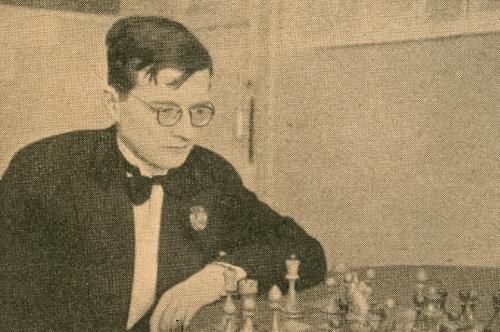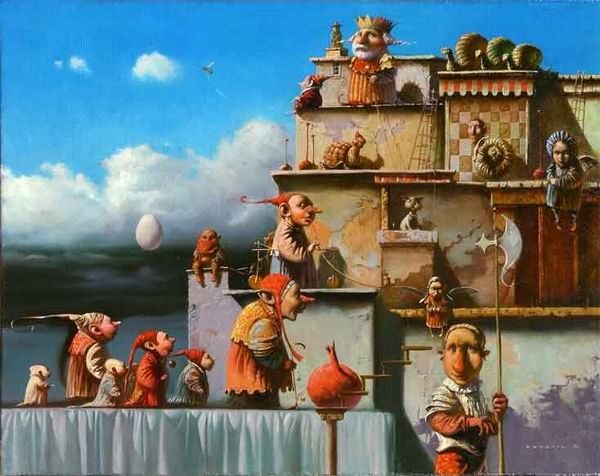
Shostakovich: An Unexpected Sparring Partner of... Guess Who!
Once on Dmitri Shostakovich’s desk in his study I noticed several neatly clipped newspaper chess problems. Catching my glance, the composer said:
“I’ve been playing chess since about the age of ten…”
“I’ve heard that you’ve played with Sergey Prokofiev and David Oistrakh and they had a reputation of very good chess players.”
“Not only with them,” Shostakovich said with a mysterious smile. After a suitable pause he added: “Once I was lucky enough to have a game with –”
I waited expectantly. And he began a story.

In my free time and even in between performances I liked to play a game of chess.
In the early post-revolutionary years in Leningrad I didn’t miss a single Soviet or foreign film. I was very fond of the cinema. In fact, for a while I even worked as a piano player in a film theater — in days when the pictures were silent.
So, one day I went to see a film in the afternoon. It was still early and in the lobby people were leafing through magazines and whiling away the time.
A modestly dressed, insignificant looking man walked in. His gaze was arrested by a chessboard on a little table. Someone has obviously abandoned a game when the film started. He began to study the position.
I went up to him and proposed a game.
He looked me over from head to foot, smiled gently, and nodded. We drew for the White or Black, he won and made the first move.
After my fourth or fifth move my partner looked at me oddly and began to consider. No doubt he had never encountered such a strange opening.
Now I realize that that unusual opening must have served him as a departure point for some original ideas, must have given rise to thoughts.
After reflection, he made his move. It didn’t appear to me to be a strong one, and I went on the attack. Before I knew it, my king was in serious trouble…
Now it was my turn to think, and while I was hemming and hawing, trying to find a way out, I was constantly aware of the attentive grey, somewhat ironic eyes of the stranger fixed on me.
My partner finished me off with ease. I had never suffered such a quick defeat.
 Dmitri Shostakovich in 1957, photo Nicholas Tikhomirov
Dmitri Shostakovich in 1957, photo Nicholas Tikhomirov
A few moments remained until the start of the film. Apparently, something in my game had attracted the stranger. Perhaps he had been surprised by the unusual opening.
He noticed that I was upset.
“Have you been playing chess long?”
“Three years…”
“You don’t recognize me?”
“No,” I replied, at a loss.
“Alekhine…”
The bell went at that moment.
“Let me introduce myself: Alekhine, Alexander Alexandrovich…” he said, and walked away into the viewing hall.
I don’t remember what was on that day. I wasn’t watching the screen, but Alekhine.
From that day on I became a fierce fan of my unexpected partner. And when, a few years later — in 1927 — in far-off Argentina, he beat Capablanca, the reigning world champion, I was absolutely ecstatic. I think I was no less happy than Alekhine himself. After all, I was one of his sparring partners.
.
Source: Mikhail Dolgopolov, orig. in Izvestia, from the June 1975 Sputnik, the Digest of Soviet Press
* * *
Next time you are defending a difficult position, don’t get discouraged, just think of the WWII defense of Leningrad. To boost your spirits, just compare your defensive efforts over a number of 10-20 moves with 900 days of untold heroism and bravery of the people of the besieged city of Leningrad. The most terrible siege in human history. At least 641,000 people had perished in Leningrad during the Siege due to famine, cold, shelling… But they resisted the enemy.
 Poster announcing Shostakovich’s 7th symphony concert in the besieged Leningrad
Poster announcing Shostakovich’s 7th symphony concert in the besieged Leningrad
Symphony performances for survivors of the siege were rare, but attendance was rather high, regardless of the risks and exhaustion of everybody. Perhaps the most important booster of morale was Shostakovich’s Seventh Symphony, entitled “Leningrad”. The symphony did much to raise the spirits of defenders as well as the Allies abroad; at its Leningrad premiere, Marshal Zhukov ensured what was called the “eighty minutes of silence,” when the soldiers at the Front did their utmost to stop city bombings so as to not interrupt the performance. Music performances were broadcast over the Leningrad radio 24/7. At rare times when music was not broadcast, a metronome was placed before the radio microphone to assure the people that the resistance was ongoing. Performers and radio personnel worked without compensation, they received 250–500 grams of ration food per day, mainly low grade bread…
 Shostakovich composing the 7th
Shostakovich composing the 7th
 Summer and Fall of 1941, Shostakovich on Firemen duty
Summer and Fall of 1941, Shostakovich on Firemen duty
